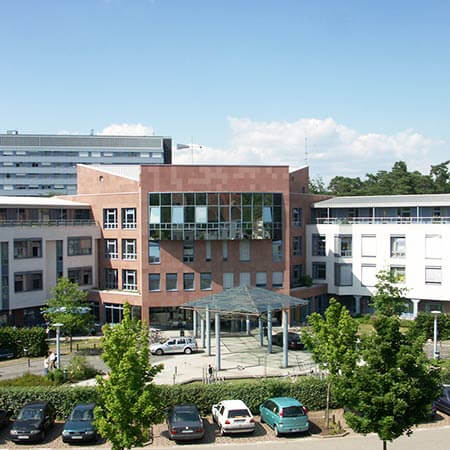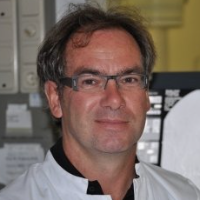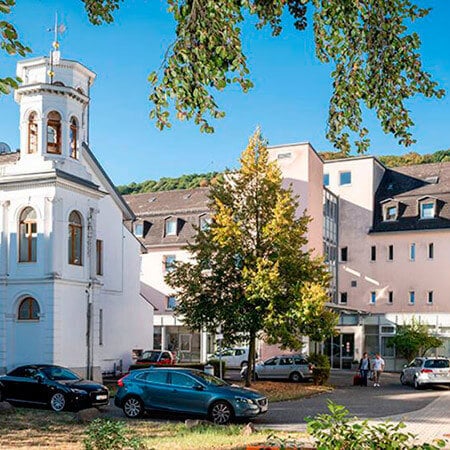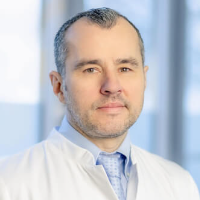Liver Cancer — Alcohol or Radiofrequency Tumor Nodes Ablation: treatment in the Best Hospitals in the World
Treatment prices are regulated by national law of the corresponding countries, but can also include additional hospital coefficients. In order to receive the individual cost calculation, please send us the request and medical records.

Department of Interventional Neuroradiology
The Department of Interventional Neuroradiology offers the full range of services in the areas of its specialization. The medical facility provides imaging diagnostics and low-traumatic image-guided interventional treatment of nervous system diseases. The department's specialists have rich experience and exceptional professional skills in the field of interventional procedures for acute and chronic vascular diseases, such as ischemic strokes, brain hemorrhages, cerebral artery stenosis, brain aneurysms, and vascular malformations. The department's neuroradiologists cooperate closely with neurologists and neurosurgeons so that each patient receives an optimal treatment regimen based on the expert opinions of the specialists. The department's medical team has state-of-the-art computed tomography (CT), magnetic resonance imaging (MRI), and MR angiography systems that are actively used for diagnosing patients and therapeutic procedures. Medical care is provided in compliance with current clinical protocols. The department also offers many outpatient medical services, which is an advantage for many patients.




Department of Adult and Pediatric Diagnostic, Interventional Radiology
The Department of Adult and Pediatric Diagnostic, Interventional Radiology offers all modern methods of high-precision imaging diagnostics and minimally invasive imaging-guided therapeutic procedures. The department meets all radiation protection standards, which are especially important in the diagnostics of children and adolescents. The basis of successful clinical practice of the medical facility is a progressive technological base and the best highly qualified specialists.



Department of Interventional Radiology
The Department of Interventional Radiology offers the full range of modern diagnostic procedures using ionizing radiation, image-guided tissue sampling (biopsy), and minimally invasive therapeutic procedures. Patients may be seen on an inpatient or outpatient basis. To achieve optimal results, the department works closely with specialists in radiation therapy, oncology, neurology, neurosurgery and neuro-oncology, as well as urology, orthopedics, pain management, and palliative care. This collaboration helps ensure an accurate diagnosis and the most effective treatment.




Most patients are diagnosed with liver cancer at an inoperable stage. Surgery cannot be performed due to the spread of the tumor or the low functional reserve of the liver, as the disease often develops against the background of viral hepatitis and liver cirrhosis. However, this does not mean that the options for treating the disease are exhausted. If the tumor cannot be removed, it can be destroyed by alcohol or radiofrequency ablation of tumor nodules in liver cancer.
Content
- What is alcohol ablation for liver cancer?
- Advantages and disadvantages of alcohol ablation for liver cancer
- Indications for alcohol ablation for liver cancer
- What is radiofrequency ablation for liver cancer?
- Indications for radiofrequency ablation for liver cancer
- Benefits of ablation for liver cancer
- Where can I have an ablation procedure for liver cancer?
What is alcohol ablation for liver cancer?
Alcohol ablation (alcoholization) is a type of chemical ablation in which ethyl alcohol is injected into the tumor area. Historically, it was one of the first ablation techniques. It has been used for the treatment of liver cancer for more than 40 years.
The principle of the method is to achieve coagulation necrosis (death) of the tissue by injecting 95% ethyl alcohol. The second mechanism of action is the formation of blood clots in the blood vessels. This causes ischemia (oxygen starvation) of the tumor nodules in the liver, which enhances the effect of ablation.
The method can be used to treat patients with small tumor nodules. The best results can be achieved if it has been completely destroyed. The probability of complete destruction of a nodule by alcoholization is as follows:
- Up to 75% in patients with tumors up to 5 cm in size
- Up to 60% in patients with tumors larger than 5 cm
Even if the tumor was not completely destroyed the first time, the procedure can be repeated in the future.
Advantages and disadvantages of alcohol ablation for liver cancer
If alcohol ablation is compared to other types of this procedure, it has both advantages and disadvantages.
The advantage is the low cost of the method and the absence of heating of the tissues located near the tumor, which allows the procedure to be performed even if the tumor foci in liver cancer are located near large blood vessels.
Disadvantages include a less pronounced effect compared to radiofrequency ablation, the need for several procedures, and an area of destruction that is difficult to control.
Indications for alcohol ablation for liver cancer
Both alcohol and radiofrequency ablation can be performed in the following cases:
- A small liver tumor that cannot be resected due to problems with the patient's internal organs or a low functional reserve of the liver
- Cancer recurrence after liver resection
- Recurrence or continued tumor growth after hepatic artery chemoembolization
Conditions for a successful procedure include the following:
- Tumor size of 4 cm or less
- The number of tumor nodules is no more than four
- The lesion does not exceed 30% of the liver parenchyma volume
Although alcohol ablation cancer treatment is usually used as a stand-alone procedure, in some cases it may be used as an adjunct to surgery. For example, doctors may remove a larger tumor and then destroy small tumor foci in another lobe of the liver.
What is radiofrequency ablation for liver cancer?
Radiofrequency ablation for liver cancer is the most commonly used procedure worldwide due to its simplicity, high efficiency, and safety. The technique is well researched because it has been used in medicine for more than 30 years.
The essence of the treatment method is that a probe is inserted into the tumor through a skin puncture and then heated. The zone of thermal effect spreads from the point of probe insertion to the periphery, causing the formation of a necrosis area of varying diameter, depending on the size of the tumor.
It is usually a minimally invasive procedure, requiring only a skin puncture to insert the probe. A laparoscopic approach is used less frequently, and an open approach (laparotomy) is a very rare option that may be used if the probe cannot be safely inserted into the tumor through a direct skin puncture.
Indications for radiofrequency ablation for liver cancer
The treatment method can be used in the following cases:
- Liver tumors up to 5 cm in size
- It is possible to treat neoplasms larger than 5 cm if they shrink in size under the influence of other treatments
- Presence of up to 5 tumor foci
- Residual tumor after any treatment of liver cancer
- Local recurrence of liver cancer
A prerequisite for the use of both radiofrequency ablation and any other ablation techniques for tumor foci in liver cancer is the absence of extrahepatic metastases.
Radiofrequency ablation has greater capabilities than alcohol ablation and is more effective because it usually allows complete destruction of tumor foci during a single procedure. At the same time, it requires certain conditions:
- Clear imaging of tumor foci (requires ultrasound or CT guidance for inserting the probe into the very center of the tumor)
- Possibility of safe access to the tumor nodule
- Location of the tumor at a considerable distance from the major blood vessels of the liver
The method can be used when tumor nodes are located only in the liver, with no signs of disease spread to neighboring organs.
Benefits of ablation for liver cancer
Liver cancer treatment with various ablation options has become widespread in developed countries, as this group of methods has many benefits. These are as follows:
- Minimal trauma rate
- No prolonged hospitalization and rehabilitation are required
- Low cost of cancer therapy
- The method can be performed for patients with contraindications to surgery
- The method of liver cancer treatment is compatible with surgery, chemoembolization, and any kind of systemic therapy
Where can I have an ablation procedure for liver cancer?
You can undergo your treatment abroad. Modern hospitals use a variety of ablation options, such as alcohol ablation, radiofrequency ablation, microwave ablation, cryoablation, ultrasound ablation, and others, so that the ideal treatment method can be selected for each patient.
You can find out the cost of treatment and choose an oncology center on the Booking Health website. Our website represents the world's best hospitals. With Booking Health's support, you can compare prices in different oncology centers and choose the most suitable option. Our company's specialists will help you select the most suitable hospital and organize your trip.
The cost of treatment for you will be lower if you make your appointment through Booking Health. The lower price is due to the absence of additional fees for foreign patients.
Authors:
The article was edited by medical experts, board certified doctors Dr. Nadezhda Ivanisova and Dr. Vadim Zhiliuk. For the treatment of the conditions referred to in the article, you must consult a doctor; the information in the article is not intended for self-medication!
Our editorial policy, which details our commitment to accuracy and transparency, is available here. Click this link to review our policies.
Sources:

